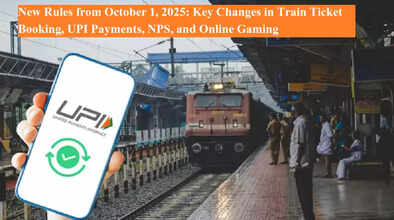New Rules from October 1, 2025: Key Changes in Train Ticket Booking, UPI Payments, NPS, and Online Gaming

New Delhi, September 27, 2025: Starting October 1, 2025, several new rules will come into effect across India that will directly impact people’s daily lives. These include major changes in railway ticket booking, digital payments, pension investments, and online gaming regulations. The government has introduced these reforms to enhance transparency, strengthen security, and protect consumers from fraud.
IRCTC Train Ticket Booking Rules to Change
The most notable change will be seen in railway ticket booking through IRCTC. From October 1, the first 15 minutes of online general ticket booking will be reserved only for passengers whose IRCTC accounts are linked with Aadhaar and fully verified.
This move is aimed at curbing the misuse of the system by touts and agents who often book tickets in bulk, making it difficult for genuine passengers to get confirmed seats. The new rule is expected to bring more fairness and transparency, especially during the festive and wedding seasons when ticket demand peaks.
It is important to note that offline bookings through PRS counters will remain unaffected by this change.
UPI Payments: “Collect Request” Feature Discontinued
In digital payments, the National Payments Corporation of India (NPCI) has announced a significant update. Starting October 1, the “Collect Request” feature in UPI apps such as Google Pay, PhonePe, and Paytm will be discontinued.
This feature allowed users to send a money request to others, but it also became a target for phishing scams and fraud. By removing it, NPCI aims to strengthen user safety and reduce online payment risks. Experts say this change will encourage users to rely only on direct payments and QR code transactions, minimizing the chances of falling prey to fraudulent requests.
New Pension Framework Under NPS
The National Pension System (NPS) will also see a structural change. A new multi-scheme investment framework will come into effect, allowing employees from the private sector, corporate professionals, and gig workers to invest in multiple pension schemes using a single PAN number.
This flexibility will enable investors to diversify their retirement savings across different schemes based on their risk appetite and financial goals. It is expected to make NPS more attractive to younger professionals and self-employed individuals who seek better long-term investment choices.
Stricter Regulations for Online Gaming
The booming online gaming industry in India will now come under stricter regulation. From October 1, the government’s new framework for monitoring and regulating online gaming companies will be implemented.
The rules are designed to protect players from fraud, scams, and illegal money-based gaming. Gaming platforms will be required to comply with strict transparency guidelines, and authorities will monitor their operations closely. Industry experts believe this move will help promote responsible and safe gaming practices in the country.
Why These Reforms Matter
Each of these changes reflects the government’s broader objective of ensuring transparency, security, and consumer protection.
-
For railway passengers, the Aadhaar-linked booking rule will reduce the black-marketing of tickets.
-
For digital users, discontinuing the UPI collect request will minimize fraud risks.
-
For investors, the new NPS framework will allow more control and flexibility in retirement planning.
-
For gamers, the new laws will ensure a safer and more transparent environment.
Conclusion
The rules coming into effect on October 1, 2025, mark a significant shift across multiple sectors—railways, fintech, pensions, and gaming. While these may require some adjustment from users, the long-term benefits of greater security, fairness, and transparency are expected to outweigh any initial inconvenience.
As these changes roll out, citizens are advised to stay updated, adapt to the new systems, and take full advantage of the benefits designed to make everyday services more reliable and safe.

